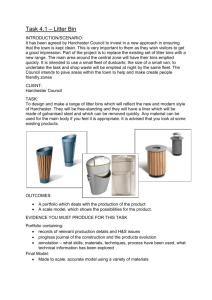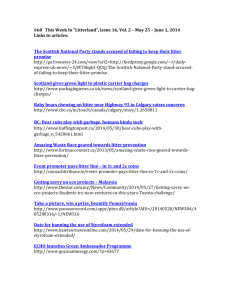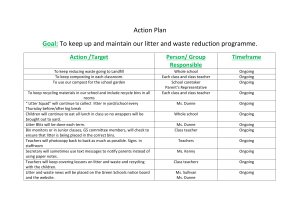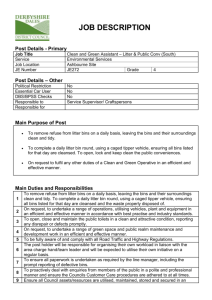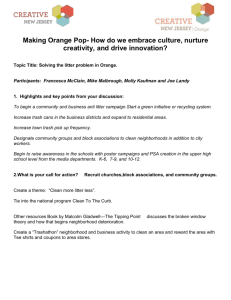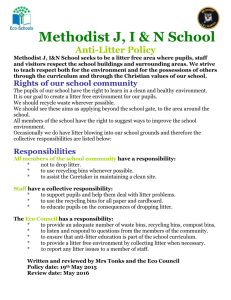LITTER STRATEGY SUBMISSION
advertisement
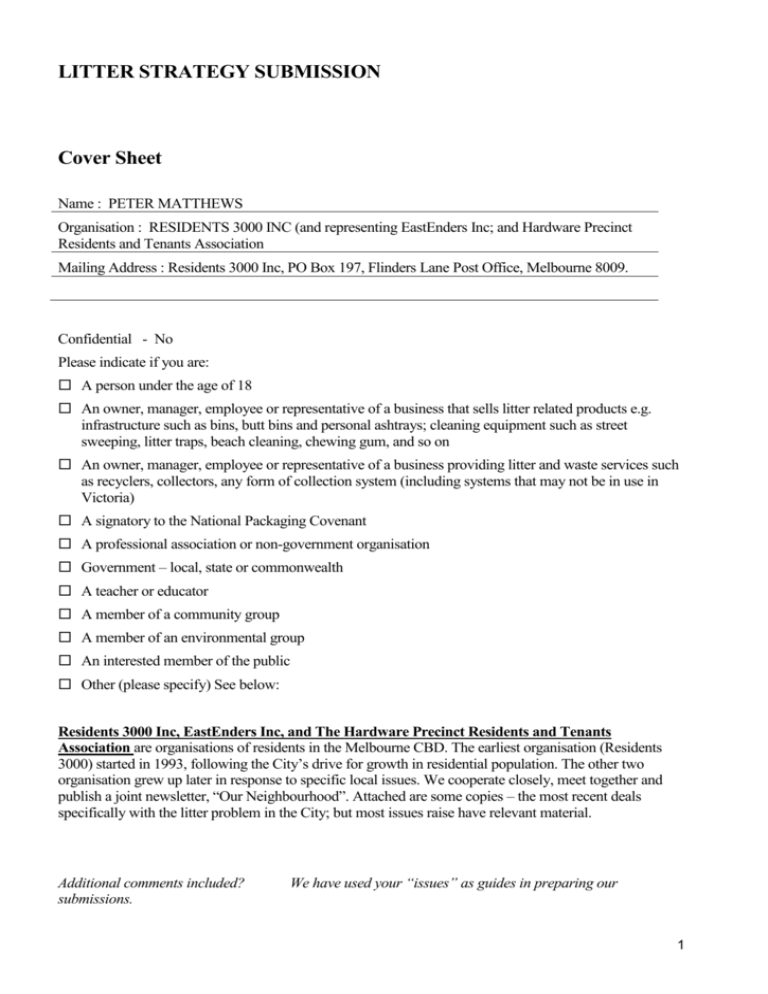
LITTER STRATEGY SUBMISSION Cover Sheet Name : PETER MATTHEWS Organisation : RESIDENTS 3000 INC (and representing EastEnders Inc; and Hardware Precinct Residents and Tenants Association Mailing Address : Residents 3000 Inc, PO Box 197, Flinders Lane Post Office, Melbourne 8009. Confidential - No Please indicate if you are: A person under the age of 18 An owner, manager, employee or representative of a business that sells litter related products e.g. infrastructure such as bins, butt bins and personal ashtrays; cleaning equipment such as street sweeping, litter traps, beach cleaning, chewing gum, and so on An owner, manager, employee or representative of a business providing litter and waste services such as recyclers, collectors, any form of collection system (including systems that may not be in use in Victoria) A signatory to the National Packaging Covenant A professional association or non-government organisation Government – local, state or commonwealth A teacher or educator A member of a community group A member of an environmental group An interested member of the public Other (please specify) See below: Residents 3000 Inc, EastEnders Inc, and The Hardware Precinct Residents and Tenants Association are organisations of residents in the Melbourne CBD. The earliest organisation (Residents 3000) started in 1993, following the City’s drive for growth in residential population. The other two organisation grew up later in response to specific local issues. We cooperate closely, meet together and publish a joint newsletter, “Our Neighbourhood”. Attached are some copies – the most recent deals specifically with the litter problem in the City; but most issues raise have relevant material. Additional comments included? submissions. We have used your “issues” as guides in preparing our 1 LITTER STRATEGY SUBMISSION FROM RESIDENTS 3000 INC; EASTENDERS INC; AND THE HARDWARE PRECINCT RESIDENTS AND TENANTS ASSOCIATION INTRODUCTION Our organisations represent residents in the Melbourne CBD (Postcode 3000) .The following submission relates only to the CBD (although some ideas may have a wider relevance). In the CBD, the Melbourne City Council is generally the responsible authority. Users of the City: Melbourne inner City has a large and mixed population: workers, proprietors of businesses, shoppers, local and overseas students, commuters criss-crossing the City on the tram routes, those attending entertainment, sporting and leisure venues, tourists (national and international) and residents. The City is also used by sports fans. The CBD covers a small area, with a daily changing, dense and diverse population. Problems of communication: Many users of the City do not have English as their first language. But in addition it is important to be aware that the people who own the buildings (lessors) are the ones who receive council notifications about refuse regulations but are often not the users of the buildings (lessees). In many cases we find that the lessees of the premises do not receive clear information about council refuse regulations. Local residents have often had to explain the rules!! All litter: A major form of litter is the green rubbish bins left out on the kerb, empty, full or over-flowing – for days and even weeks. There are council regulations against this but they are not enforced. The visual impact of this marks Melbourne as a “careless” (rather than a “vibrant)” City. The City seems to have given up on monitoring this situation. Most people in the CBD would say that priorities can be determined by observation. The visual impact of litter in the City is very direct to all the various populations mentioned above. For example a resident of the CBD who spends a good deal of time in the Sydney CBD, has written to us: “It is an extraordinary fact that mad, fast and much bigger inner-City Sydney is clean! Everything is clean, even the train stations!! It is an incredible thing to recognise and to say”. Most people in Melbourne were aware of a “clean up” for the Commonwealth Games – but they are now appalled at what they see all over the CBD – people say, “Why has nobody has bothered to clean up since the Games”. 2 The CBD covers a small area, with a dense and diverse population every day. Priorities could be determined by regular monitoring of defined areas. We would be prepared to recruit people in each locale to help with this work (both residents and business people/traders/precincts). – see below* The long-term management of litter requires an ethic of civic mindedness in both long-term and shortterm users of the City. People who use our City need to be given a reason to develop a pride it; then litter will be unacceptable to everyone alike. The basic requirements are an efficient refuse collection system; clearly communicated City/State Regulations to support a newly promoted civic ethic; an effective compliance system to make the regulations effective ; involvement of citizens through – a volunteer program of “City Guardians” ( see below*); and a litter-tax on fast food manufacturers and retailers. KEY ISSUES ARE ADDRESSED IN THE FOLLOWING: Retailer Litter Tax: Litter needs to be measured so to that it can be costed. That cost needs to be returned to retailers (and manufacturers) in the form of a clearly defined ‘Litter-Tax’. Audits of litter could be instituted. Office and apartment buildings: ‘Butt-Out Bins Every building should be required to have “butt-out bins” in their forecourts, door recesses, and other places where people smoke; and should be required by regulation to keep them serviced (most don’t at present.) Business premises and their staff contribute enormously to litter. There was a “butt audit” last year; BUT no apparent outcome. Commercial buildings employ a garbage firm and think that’s enough. They and their staff do not care what happens. All sorts of garbage bins are left out on the streets and in our lanes for days and even weeks. Melbourne is proud of its lanes! But 50 bins in one well-used lane tends to give the lie to that. This is another Compliance issue. Street life: The increase in street smoking, street drinking is growing; and will continue to grow with implementation of the new tobacco rules. This involves not only butts but also dumped bottles and cans on the footpath or in the gutter. We believe the Police are very concerned about street drinking. All levels of Government need to address this issue. Compliance: Implementation of Council Local Laws is inadequate. There is a Compliance Team in the City of Melbourne Council. There is no evidence that this Team is either active or pro-active. And street notices about street drinking, dumping bottles and cans and butts need strengthening. Inefficient, unregulated commercial refuse collection services: We understand that there are as many as 300 different garbage collection firms in the City Municipality. Building occupiers/owners can use any one of them. Simple observation of the way garbage, rubbish and litter is handled in the CBD reveals many problems which contribute to the mess in our streets and lanes. Competition between garbage contractors is solely on price, NOT on performance. And the large number of garbage trucks (many very big) adds to the hazards of City streets and causes traffic delays, and even nasty confrontations. 3 Street cleaning: Currently this is very poorly managed. The mechanical sweepers are effective when they contact litter and refuse. But too often they miss it! Cleaning the streets with n=machines during rush hours is impossible! Cleaning streets without the use of a broom is impossible. Just watching street cleaning suggests that a great deal of time and resources is wasted. This requires proper study. Bin locations: Certain types of businesses seem to have more impact on the City environment e.g. Fast food, and takeaway food outlets, clubs and bars, 24hrs convenience shops, education colleges, and all non-smoking buildings. Melbourne has created many inviting public spaces for people to sit, relax and eat and drink e.g. Bourke Street Mall, City Square, the front of the State Library, South Bank Promenade and the Yarra Walk. People who sit on benches need bins in the vicinity and the bins need to be regularly emptied. There needs to be a Bin Audit of the strategic locations of bins. What kind of bin? The way bins are used and mis-used is a major cause of street litter. Over-full bins are accidentally knocked over by cars/trucks and then deliberately by vandals. And of course are used by graffiti and tagging people. They are a major part of the problem. WE NEED NEW THINKING ON THIS. Research is desperately needed. Are “cardboard” bins made of recycled waste the answer? These could be simply and quickly collected – used only once. Ratepayers could be supplied with a months supply at a time, folded/collapsed so that they are easily stored and then assembled when needed. The names of the building/business/residents etc each “bin” comes from could be printed on it so that anyone not following the rules could be penalised (eg putting out a bin on Monday for collection on Friday). Regulation Currently who knows the regulations? Who know the fines? Regulation needs strengthening to encourage businesses to be responsible for their patrons and staff. For example, the City seems incapable of monitoring its own Kerbside Café Code rules – a number of such “cafes” are simply kerbside bars. It is obvious that many restaurant and café owners do not seem to understand the permits under which they operate – or that they feel free to ignore them. These places also contribute to litter – and will increasingly do so with the new tobacco laws. Can we build “Civic Pride”? The City funds “precincts” in the CBD. These precincts are ready-made resources, with local knowledge. We urge collaboration between the City, precincts and residents associations in establishing and maintaining awareness of our City’s needs – to build “Civic Pride” and keep us all on their “civic toes.’ A system of volunteer ‘City Guardians’ could be helpful – almost like Neighbourhood Watch? (see below) The personal approach could be effective in many cases. A number of citizens already (politely) have a word with casual litterers – residents and business can help to instil awareness and civic pride. City Guardians could be equipped with simple brochures to distribute; and also laminated A4 posters to help businesses remember their responsibilities, and to help them remind their customers. But a more effective compliance regime needs to run alongside such a scheme. City Guardians could perform random Litter Audits once a month in the CBD. – particularly around food outlets. Melbourne could lead the country – indeed, the world - in such an innovative and cost-effective strategy. 4 Summary: Voluntary “City Guardians” organised by the City, business and residents. An award system – say “Proud Precinct Awards’, and/ or ‘Mean and Clean Street Awards’? Replacement of old style bins with well designed bins (for street, business and domestic use) and butt-out bins. More effective administration of regulations and of compliance techniques. A “Litter-Tax” on businesses that create litter. An annual external “litter audit”. Every Council decision, Local Law and government Act/Regulation should carry a report on any potential litter outcomes. In short: Civic awareness, communication and education, regulation, strong compliance, volunteers and directed litter-tax. PETER MATTHEWS PRESIDENT RESIDENTS 3000 INC (ph 9663 5892 e-mail residents@residents3000.net.au) (and on behalf of EastEnders Inc and the Hardware Precinct Residents and Tenants Association) 5
